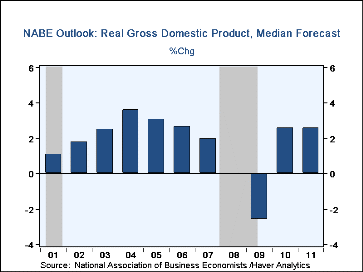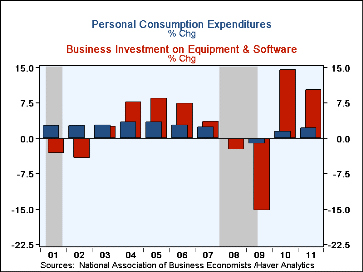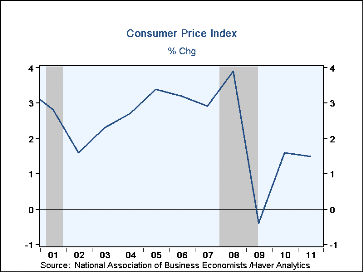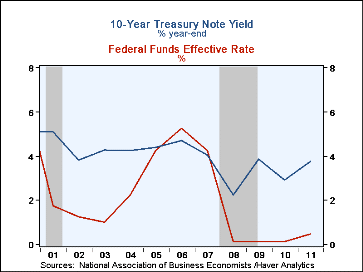 Global| Oct 11 2010
Global| Oct 11 2010NABE Lowers Expectations for Economic Growth
by:Tom Moeller
|in:Economy in Brief
Summary
In the latest report, the National Association for Business Economics indicated that moderate U.S. economic growth will continue through next year. However, expectations for 2.6% growth are down from the previous forecast of 3.2%. [...]
In the latest report, the National Association for Business Economics indicated that moderate U.S. economic growth will continue through next year. However, expectations for 2.6% growth are down from the previous forecast of 3.2%. Continuing to underpin the expansion is moderate growth in consumer spending. Contrasting forces on the investment front will supplant that recovery as housing improves just moderately but business spending on plant & equipment remains strong.
Housing starts and light motor vehicle sales both are expected to advance next year but will remain well below their pre-recession peaks. Notably, the accompanying gains in payroll employment are expected to be insufficient to lower the unemployment rate much below current levels. The moderate nature of the recovery is expected to exert just modest upward pressure on consumer prices and interest rates.
Improved economic growth is projected to generate positive growth in corporate profitability but the rate of advance in 2011 will slow by two-thirds from this year. Moderate growth also is expected to do little to reduce the federal government budget deficit; still at $1.2 trillion next year.
The figures from the latest NABE report can be found in Haver's SURVEYS database.
| National Association For Business Economics | 2011 | 2010 | 2009 | 2008 | 2007 |
|---|---|---|---|---|---|
| Real GDP(% Chg. SAAR) | 2.6 | 2.6 | -2.6 | 0.0 | 2.0 |
| Personal Consumption Expenditures | 2.3 | 1.5 | -1.2 | -0.3 | 2.4 |
| Nonresidential Structures | 2.3 | 1.5 | -1.2 | -0.3 | 2.4 |
| Producers' Durable Equipment & Software | 10.3 | 14.6 | -15.3 | -2.4 | 3.7 |
| Residential Investment | 7.5 | -0.6 | -22.9 | -24.0 | -18.7 |
| Change in Real Business Inventories (Bil. $) | 49.9 | 58.0 | -113.1 | -37.6 | 27.7 |
| Real Net Exports (Bil. $) | -439.7 | -416.6 | -363.0 | -504.1 | -654.9 |
| Housing Starts (Mil. Units) | 0.75 | 0.60 | 0.55 | 0.91 | 1.36 |
| Light Vehicle Sales (Mil. Units) | 12.8 | 11.4 | 10.4 | 13.2 | 16.1 |
| Payroll Employment Avg. Mthly. Change (000s) | 153 | 94 | -395 | -302 | 90 |
| Unemployment Rate (%) | 9.3 | 9.7 | 9.3 | 5.8 | 4.6 |
| Consumer Price Index (Y/Y %) | 1.5 | 1.6 | -0.4 | 3.9 | 2.9 |
| Fed Funds Rate (%) | 0.50 | 0.13 | 0.13 | 0.13 | 4.25 |
| 10-Year Treasury Note (%, Year End) | 3.75 | 2.93 | 3.85 | 2.25 | 4.04 |
Tom Moeller
AuthorMore in Author Profile »Prior to joining Haver Analytics in 2000, Mr. Moeller worked as the Economist at Chancellor Capital Management from 1985 to 1999. There, he developed comprehensive economic forecasts and interpreted economic data for equity and fixed income portfolio managers. Also at Chancellor, Mr. Moeller worked as an equity analyst and was responsible for researching and rating companies in the economically sensitive automobile and housing industries for investment in Chancellor’s equity portfolio. Prior to joining Chancellor, Mr. Moeller was an Economist at Citibank from 1979 to 1984. He also analyzed pricing behavior in the metals industry for the Council on Wage and Price Stability in Washington, D.C. In 1999, Mr. Moeller received the award for most accurate forecast from the Forecasters' Club of New York. From 1990 to 1992 he was President of the New York Association for Business Economists. Mr. Moeller earned an M.B.A. in Finance from Fordham University, where he graduated in 1987. He holds a Bachelor of Arts in Economics from George Washington University.
More Economy in Brief
 Global| Feb 05 2026
Global| Feb 05 2026Charts of the Week: Balanced Policy, Resilient Data and AI Narratives
by:Andrew Cates










